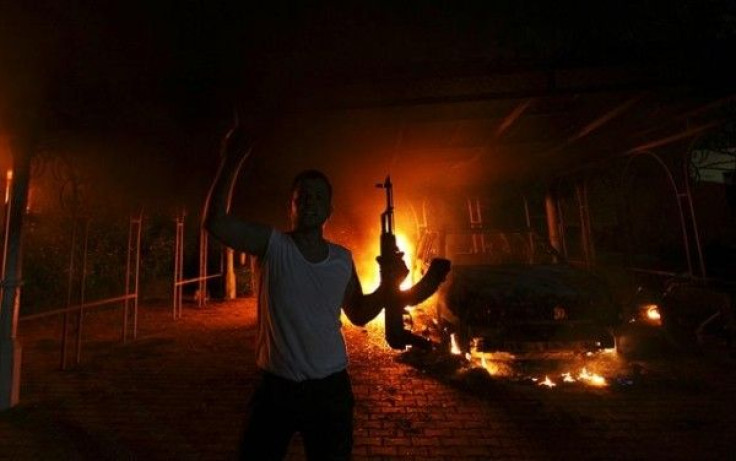Sam Bacile And His Low-Budget Anti-Muslim Movie: Is It All A Hoax?

Details -- however minimal -- have begun to surface about the amateur filmmaker whose movie ridiculing the Islamic prophet Muhammad sparked deadly protests in Egypt and Libya.
Four Americans have been killed in the demonstrations, including the U.S. ambassador to Libya. In Cairo, protesters climbed the walls of the U.S. embassy compound and tore down the American flag. "There is no god but Allah and Mohammed is his messenger," they chanted.
All this over a few movie clips that look like they were produced by a group of high schoolers in a Video 101 class. Reminiscent of low-budget, unfunny comedy sketches, the clips -- supposedly from a movie called "Innocence of Muslims" -- depict Muhammad as a freewheeling, womanizing shyster who promoted child abuse. It sparked violent protests on Tuesday after clips of the film surfaced on YouTube, some of which were later dubbed in Arabic.
But so far only scant details are known about the movie's shadowy writer/director who calls himself Sam Bacile. The only interviews with him have been done by phone, and what little information he has revealed raises more than a few red flags.
So is there a Sam Bacile, and does "Innocence of Muslims" even exist?
In an interview with the Wall Street Journal, Bacile identified himself as an Israeli-American real estate developer based in California. But Internet searches reveal no trace of a real estate developer doing business under that name. His age is in question as well. The Wall Street Journal said he was 52 while AP reported his age at 56.
Bacile has reportedly gone into hiding following the protests. Speaking by phone to the Times of Israel, he said he was not anticipating the violent reaction provoked by the film. "I feel sorry for the embassy. I am mad," he said.
But according to Steve Klein, who claims to have worked as a consultant on the film, Bacile knew it would ignite violence. Speaking to the Associated Press on Wednesday, Klein claimed to be reluctant in helping Bacile with the movie, telling him, "You're going to be the next Theo van Gogh." The comment was a reference to the Dutch filmmaker who in 2004 was gunned down by an Islamic extremist after he made a movie that criticized Muslim societies' treatment of women.
In fact, Klein himself is a shadowy figure. He apparently authored a self-published book on Islam (with a poorly designed cover), but aside from that, he has not left many tracks. In a phone interview with the Atlantic on Wednesday, Klein said he believes Bacile is not Israeli and, most likely, not Jewish. He also said that Bacile was a pseudonym and that he did not know his real name.
Bacile claims to have made "Innocence of Muslims" on a budget of $5 million with the help of 100 Jewish donors, but one look at the film clips on YouTube will call that claim into question. The movie appears to have been shot on a consumer-grade DV camcorder with amateur actors, fake backgrounds and cheap sets. The lighting and sound are of equally low quality. In Hollywood dollars, $5 million may be considered low-budget, but if the filmmaker really spent that much money on this shoddy work, it's his donors who should be doing the protesting.
Meanwhile, efforts to uncover the film's anonymous funders have so far turned up nothing. Jeffrey Goldberg, national correspondent for the Atlantic, tweeted on Wednesday: "I would love to know more about Mr. Sam Bacile, whom no Jew I know has ever heard, and his 100 mysterious backers."
That's assuming there even is a film. In early July, two 13-minute clips were posted on a YouTube account by someone with the username Sam Bacile, but no one has come forward claiming to have seen the finished product. Moreover, IMDb lists nothing for the project or Bacile himself, to say nothing of the supposed 59 actors and 45 crewmembers who worked on it.
According to AP, Bacile said he screened the movie to a "nearly empty" theater in Hollywood, but he did not name a specific venue. Google searches reveal no evidence of a screening ever being announced, and given the subject matter, it's unlikely that an established Hollywood screening room would have agreed to show it.
Whatever details continue to emerge, the only thing we know for certain that someone intended to create an inflammatory attack on the Muslim faith, which considers depictions of the prophet Mohammed extremely offensive, and that he intended to make it clear that his film was funded by Jews.
On Tuesday, Bacile told the Wall Street Journal that Islam is "a cancer," and that the movie is meant as a political statement, not a religious one.
What statement he truly intended to make is one of the many questions that remain unanswered.
© Copyright IBTimes 2024. All rights reserved.












